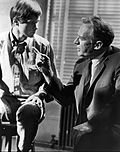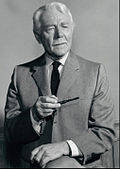| Tony Award for Best Featured Actor in a Play | |
|---|---|
 2025 recipient: Francis Jue | |
| Description | Best Performance by an Actor in a Featured Role in a Play |
| Location | United States New York City |
| Presented by | American Theatre Wing The Broadway League |
| Currently held by | Francis Jue for Yellow Face (2025) |
| Website | TonyAwards.com |
The Tony Award for Best Featured Actor in a Play is an honor presented at the Tony Awards, a ceremony established in 1947 as the Antoinette Perry Awards for Excellence in Theatre, to actors for quality supporting roles in a Broadway play. Honors in several categories are presented at the ceremony annually by the Tony Award Productions, a joint venture of The Broadway League and the American Theatre Wing, to "honor the best performances and stage productions of the previous year." [1]
Contents
- Winners and nominees
- 1940s
- 1950s
- 1960s
- 1970s
- 1980s
- 1990s
- 2000s
- 2010s
- 2020s
- Statistics
- Most wins
- Most nominations
- Character win total
- Character nomination total
- Productions with multiple nominations
- Multiple awards and nominations
- Trivia
- See also
- Notes
- References
- External links
The award was originally called the Tony Award for Actor, Supporting or Featured (Dramatic). It was first presented to Arthur Kennedy at the 3rd Tony Awards for his portrayal of Biff Loman in Arthur Miller's Death of a Salesman . Before 1956, nominees' names were not made public; [2] the change was made by the awards committee to "have a greater impact on theatregoers". [3]
Frank Langella holds the record for having the most wins in this category, with a total of two; he is the only person to win the award more than once. Richard Roma in Glengarry Glen Ross, Phil Hogan in A Moon for the Misbegotten, and Mason Marzac in Take Me Out are the only characters to take the award multiple times, all winning twice.






































